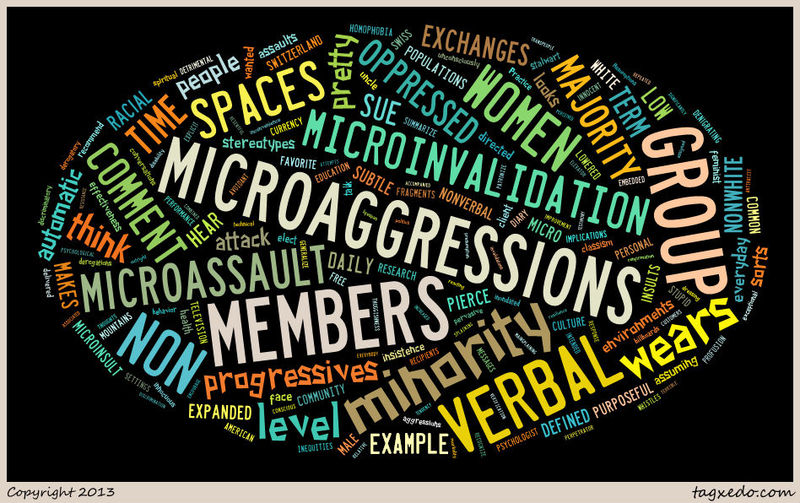By Linda Mornell
After many years in private practice, my experience is that we, all of us, tend to find what we are looking for: unconsciously.
For example, the young woman who comes to me because she wants to find a man to marry – yet deep down believes all men will eventually let her down—inevitably picks men who will indeed do just that. The adolescent who believes that the world is out to get him will find evidence over and over that this is true.
The same is true with micro aggressions. Micro aggressions are part of a new language on college campuses today. They are defined as the everyday verbal and nonverbal slights, snubs, or insults that communicate derogatory or negative messages based on race or ethnicity. They may be intentional or unintentional.
Today’s college students are looking for them and finding them everywhere. What’s underneath this current focus on micro aggressions on todays’ most exclusive college campuses? Why do so many of our so very privileged students identify as victims yet act like bullies? And what is our role as parents and grandparents in creating this mess?
I think it is important to differentiate between the over privileged and the underprivileged student in this surprising turn of events. Most of our over privileged students have shared some common parenting behaviors in the last two decades. They have been protected from deprivation of any kind—never hungry, cold, or without whatever they need. Materially, they have had almost everything they want. They have been told with regularity that they are exceptional.
What have we asked in return? That they achieve the grades and scores that will automatically gain admittance to our top schools and universities. Kindergarten through 12th grade is more than getting an education, it’s a stressful race to be at the top—in other words to beat out the next kid in order to safely land in the “right” college of choice.
Any failure – a low grade, a lost race, forgotten homework – is immediately smoothed over by a parent. External appearances and achievement are the singular goal with very little room for experimentation. And yet, as the late psychologist Eric Erickson has written so eloquently, the essential developmental imperative for every adolescent is to find their own unique identity, something that requires experimentation and failure.
So armed with a massive, sometimes heartbreaking investment in external performance, our over privileged adolescents finally win the cherished prize to prestigious colleges – with the assurance that the all nighters, the stress over maintaining perfect grades, will set them up to effortlessly succeed in not only the right college but for the rest of their lives as well. Yet even in high schools there are disturbing undercurrents, including suicide clusters. Recently, at Gunn High School in Palo Alto, Calif., Principal Denise Herrmann reported that 42 students had been hospitalized or treated for suicidal thoughts.
In today’s private colleges and universities there has been a 50 percent increase in emergency counseling requests, a dramatic increase in more serious mental illnesses as well as a serious jump in depression and suicidal ideation. Our children are not doing well. We have not served them well. We send them off to celebrate their achievements and our good parenting, often with bumper stickers on our car proudly proclaiming, “My child is a straight A student.” Yet at the same time, increasingly they leave home with no inner sense of who they are. Perhaps their rage, misguided as it is, is warranted. We have not told them the truth—we have hidden from them life’s complexities, that they are fallible, that fairness is not a given, and we have taught them that trying to fix mistakes like a lower grade through manipulation is okay. In fact, it’s something they are entitled to.
What about the cause célèbre driving the focus on micro aggressions on most college campuses today: the underprivileged? The greatest challenge of the underprivileged is not identity but isolation. As Mother Teresa said, “What we need is not a class struggle but a class encounter.
I left my private practice to start a non-profit called Summer Search to break isolation for low-income students through offering full scholarships to summer experiential education programs world-wide. Those programs are mostly available to higher income students so both groups get a unique chance for a class encounter in high school. This chance to work and live together on wilderness trips or community service programs helped them see beyond stereotypes, preparing them for college much differently. This past weekend, I had a chance to sit with a group of Summer Search alumni and listen as they talked about their feelings of being the first and often the only one in their family to become a college graduate. As they talked about the subtle messages they experienced being minorities and high achievers in their high schools and colleges, in other words micro aggressions, it was with some pain and sadness but without anger and blame. Their struggles of being the only minority in Advanced Placement classes, for example, seemed to have given them a larger perspective as well as an inner compass.
Perhaps what our over privileged young people need as they screamed at faculty member Erika Christakis and her husband to resign from counseling students at Yale University, while spitting on the students who disagreed with them, is more actual hardship and discomfort in their early years.

Leave a Reply